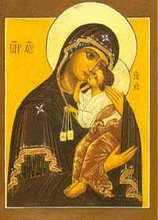How many times have you heard a homily preached on the poor apostles, poor fishermen. Has it ever sounded goofy? Have you ever thought about the wealthy apostles? I will not presume to make such a definitive statement that the priests have all been wrong who have spoken about the poor apostles, but I do challenge you to think about the arguments I make and question yourself, "Could the apostles really have been some of the wealthiest people in Israel?"
One of the arguments I hear frequently is a quote from Jesus, "It is easier for a camel to pass through the eye of a needle than for one who is rich to enter the Kingdom of God." Most people forget to add the rest of the conversation though, "All things are possible for God," and we should not forget, in the Jewish tradition wealth is a sign of God's favor.
So there is Jesus standing in Peter's boat calling Peter to follow Him. Let's put this scene into perspective. The two markets for fish were in the towns of Caesarea and Tiberius. Peter is in the family business, his family are commercial fishermen. This is no small operation. Once the fish are taken out of the Sea of Galilee they have to be delivered to the market as fresh fish, so they have to be iced. Then someone needs to stay at the market and sell the fish. How many boats were in their fleet? At least two, of course, but there is nothing that says there were not more. These were not small boats either. They were big enough to fit Jesus and all His apostles on board. This is no small investment. Before outfitting a fishing boat today you will easily spend 2.5 million dollars. The nets alone cost 200,000 dollars or more. Then you need hooks, charts, repair equipment, and what else?
Then there is Matthew, the tax collector. Could he be "Peter's IRS Man" or his business accountant, advising Peter's family on the ins and outs of Roman tax law, making a decent living on a portion of the lucrative fishing industry in the Sea of Galilee?
How about Joseph of Arimathea? He was one of the wealthiest men in the Roman Empire. He traded tin from England. He was also the great uncle of the Blessed Virgin. That is why Jesus ended up in his tomb. Mary's marriage was arranged with Joseph when she was a young teen. With such a wealthy family would her parents arrange a marriage to a poor carpenter, or was St. Joseph more than a craftsman of simple hand tools? Could a carpenter really be more like a home builder? In that case, Jesus would have been born into wealth, only to gain more from the Kings of the East who paid him homage. There were three gifts, but were there only three kings? Did each of them only bring one gift each, or could there have been a wagon train coming from the east with each king bringing gifts of gold, frankincense and myrrh? I will place myself in their shoes. If I were a king, with plenty of wealth at my disposal, and I knew of the birth of a King in the west, someone so special I thought it important to travel hundreds of miles to bring Him gifts at His birth, be certain I would bring a gift worthy of the moment, not a small token of my admiration.
Now it is getting late, but I will finish this post soon.
Thursday, March 22, 2007
Monday, March 12, 2007
Cultivating Roman Spirituality in Alaska
What is the best way for a layman to deeply impact the spirituality of a diocese? I have thought long on this question. Conservative talk radio is preaching to the choir. Writing books does the same thing. Bill O'Reilly does a good job at voicing a traditional opinion in the public arena, but how many lay people command that kind of media attention? No one can gain legitimacy standing on a street corner and accosting the public. Prayer works, but it must be accompanied by action.
So I matured as a Christian in Fabulous Las Vegas, Nevada. Yes, in decadent, Sin City there lives a deep spiritual community capable of nursing a spiritual infant to full manhood ready to feast on solid food. The parish I attended probably seated somewhere in the neighborhood of 1200 people in the sanctuary and there was standing room only every Sunday-and seven Masses! It seamed to me as if the whole valley was coming in to worship the Lord. Becoming a part of the Catholic community and thriving was never a problem. I know this is to a large extent an inside job, but none the less we are called to live in a community of Believers as well and our life as a Christian is diminished if we do not (religious hermits excluded, of course). Now I find myself in Anchorage, Alaska and longing for the spiritual life I experienced in Las Vegas.
So far the best idea I came up with on my own is to try to start a Latin class under the direction and with the blessings of the Archdiocese of Anchorage. As of yet, I have no idea where to do it, only slim clues on how to find others interested in learning Latin and no one to direct our formation. I know, it is not much of a plan yet, but I am hoping it will begin to develop a heartbeat soon! My thinking is Latin would be much more appealing to learn if we truly had a significant reason to learn it and an occasion to utilize it other than in the self indulgent pride of being able to boast that we can read Vergil in his own language. So if we pray the Liturgy of the Hours in Latin as a part of learning Latin that would be, in my mind, fulfilling. A German saying goes, if you want to think like a German, you have to talk like a German. I strongly believe the language we use heavily influences our though life and thought patterns. In this line of thinking, Latin may be a way of bringing us into closer communion with the Saints, especially if used in our prayer life, and the Liturgy of the Hours is always an excellent way to strengthen the individual, the community and the Church as a whole.
So I matured as a Christian in Fabulous Las Vegas, Nevada. Yes, in decadent, Sin City there lives a deep spiritual community capable of nursing a spiritual infant to full manhood ready to feast on solid food. The parish I attended probably seated somewhere in the neighborhood of 1200 people in the sanctuary and there was standing room only every Sunday-and seven Masses! It seamed to me as if the whole valley was coming in to worship the Lord. Becoming a part of the Catholic community and thriving was never a problem. I know this is to a large extent an inside job, but none the less we are called to live in a community of Believers as well and our life as a Christian is diminished if we do not (religious hermits excluded, of course). Now I find myself in Anchorage, Alaska and longing for the spiritual life I experienced in Las Vegas.
So far the best idea I came up with on my own is to try to start a Latin class under the direction and with the blessings of the Archdiocese of Anchorage. As of yet, I have no idea where to do it, only slim clues on how to find others interested in learning Latin and no one to direct our formation. I know, it is not much of a plan yet, but I am hoping it will begin to develop a heartbeat soon! My thinking is Latin would be much more appealing to learn if we truly had a significant reason to learn it and an occasion to utilize it other than in the self indulgent pride of being able to boast that we can read Vergil in his own language. So if we pray the Liturgy of the Hours in Latin as a part of learning Latin that would be, in my mind, fulfilling. A German saying goes, if you want to think like a German, you have to talk like a German. I strongly believe the language we use heavily influences our though life and thought patterns. In this line of thinking, Latin may be a way of bringing us into closer communion with the Saints, especially if used in our prayer life, and the Liturgy of the Hours is always an excellent way to strengthen the individual, the community and the Church as a whole.
Subscribe to:
Posts (Atom)




